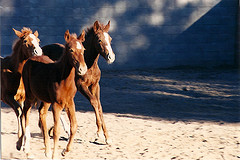
If you’re going to be traveling abroad (or you’re just curious), you might want to find out about how your pets and animal-related hobbies will be perceived by other cultures.
In the United States, the United Kingdom, and Japan, dogs are treated as beloved pets and members of the family. The notion of dogs as members of the family is a relatively recent development, and has been embraced most strongly across Western cultures. In other cultures where Islam is the majority religion, many people consider dogs unhygienic. In yet other countries, such as China, owning a dog is expensive and therefore considered a luxury.
Cows are another example of an animal that is perceived very differently across cultures. Many Hindus worship the cow for its gentle nature and consequently do not eat beef. In Argentina, by contrast, the production of beef is a source of national pride.
Horses have a long and complicated history with the human race. In the United States, riding horses has become something of its own subculture. In other cultures, Arabian horses (in the Middle East) or Andalusian horses (in Spain) have their own symbolic implications. In yet other places, horse meat is still served as food.
Contextual, economic, geographic, and religious factors have all played into the relationship between humans and animals. If you plan on living abroad, pets and animals are another culture shock factor that is not to be overlooked.
Sources:
Perceptions of Animals across Cultures: Man’s Best Friend or Dirty Beast?
